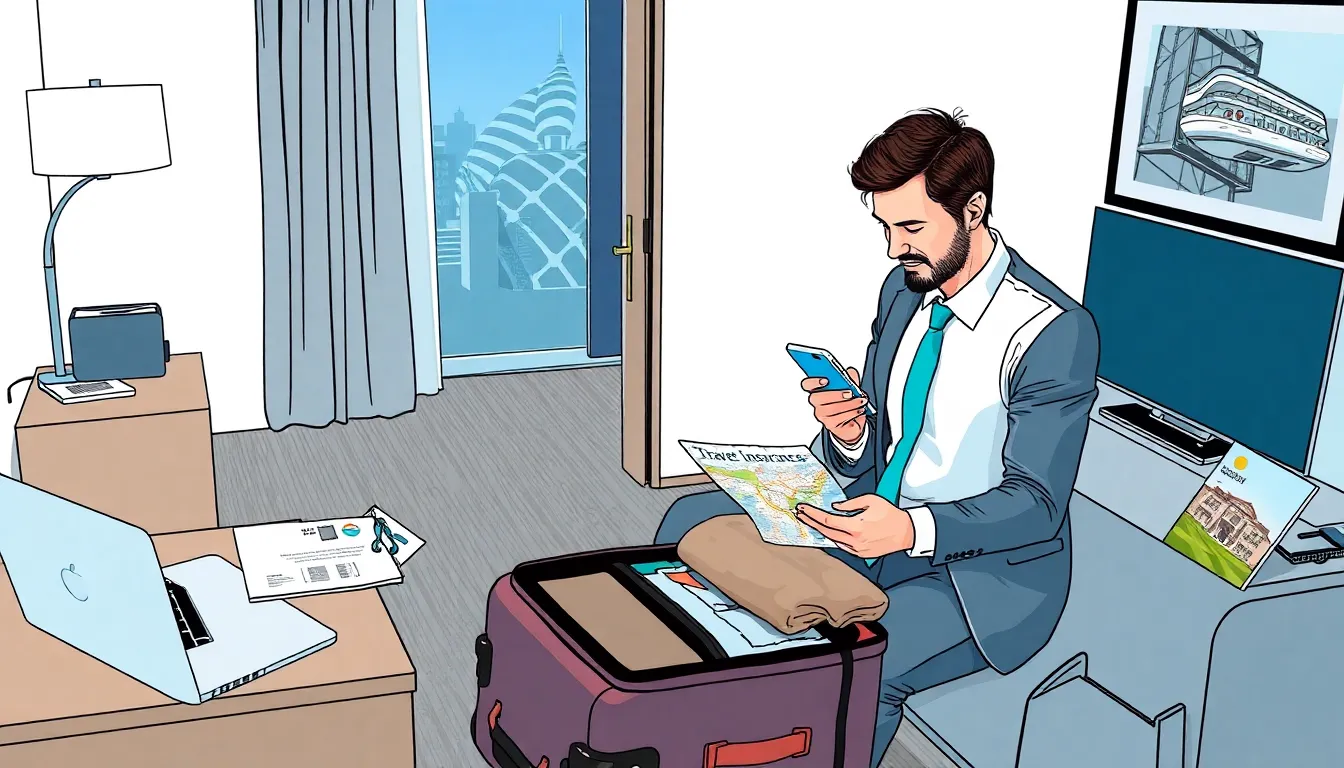Business travel can feel like a wild adventure, but it’s not all glamorous meetings and fancy hotel suites. With every flight and layover comes a unique set of risks that can turn a productive trip into a chaotic nightmare. From lost luggage to questionable street food, staying safe on the road is crucial for keeping those corporate missions on track.
Imagine stepping off a plane only to realize your suitcase took a detour to Bermuda. Or picture yourself navigating a bustling city where the local traffic seems more like a scene from an action movie than a commute. Understanding the ins and outs of business travel safety can help professionals dodge these pitfalls and focus on what really matters—closing deals and building connections. So buckle up and get ready to explore essential tips that’ll keep every business traveler secure and stress-free on their journeys.
Table of Contents
ToggleImportance Of Business Travel Safety
Business travel safety plays a crucial role in ensuring the well-being of employees on work trips. Threats such as theft, health risks, and accidents can arise unexpectedly, leading to serious consequences. Protecting employees fosters a secure environment, which, in turn, enhances productivity and morale.
Implementing safety protocols prevents situations that might disrupt critical business activities. Lost luggage can derail travel plans and waste valuable time, affecting commitments. Staying informed about local customs and laws minimizes misunderstandings and enhances interactions with clients or partners.
Investing in employee safety also safeguards company resources. Healthcare expenses following incidents can quickly add up, impacting budgets and profits. Utilizing travel safety training prepares employees to handle emergencies efficiently. Knowledge about emergency contacts and local services equips travelers with necessary tools to minimize risks.
Awareness of potential threats goes a long way. Evaluating travel destinations for safety ratings allows businesses to make informed decisions. This proactive approach ensures that employees are neither exposed to excessive risks nor forced to face dangerous situations alone.
Communication enhances safety during travel. Establishing regular check-ins keeps employers informed of their employees’ status. Using technology, like apps for sharing location information, provides reassurance in case of emergencies.
Lastly, business travel safety fosters a positive company image. Demonstrating commitment to employee well-being attracts top talent and retains current employees. Ensuring safe travel also reflects corporate responsibility, reinforcing trust with stakeholders. Making safety a priority leads to more successful outcomes and a thriving work environment.
Pre-Travel Preparations

Effective pre-travel preparations enhance safety during business trips. Research and insurance are crucial components that warrant attention.
Researching Your Destination
Understanding local customs and regulations significantly mitigates risks. Businesses must educate travelers about cultural norms, local laws, and potential health risks. Utilizing resources like government travel advisories can provide essential updates about safety issues and protocols. Moreover, travelers should familiarize themselves with local emergency contacts, including hospitals and police stations, in case of unforeseen events. Each traveler can maintain situational awareness by downloading useful apps that offer maps and safety alerts specific to their destination.
Travel Insurance Considerations
Securing travel insurance protects against unexpected incidents. Companies should evaluate policies that cover medical emergencies, trip cancellations, and lost luggage. Selecting comprehensive coverage ensures peace of mind throughout the journey. Visitors may encounter unexpected events that disrupt plans, so policies with 24/7 support services can facilitate prompt assistance. Each traveler must understand the terms and conditions to avoid surprises during a claim process. Prioritizing insurance as part of the travel plan reinforces safety and minimizes potential disruptions.
During Your Trip
Business travel can present unexpected challenges. Staying vigilant while on the road ensures safety and enhances productivity.
Staying Aware Of Your Surroundings
Awareness is crucial during business trips. Travelers should frequently scan their environment for unusual activities or potential dangers. Keeping personal belongings close helps prevent theft or loss. Engaging with locals can provide insights about safer areas and avoid potentially hazardous situations. Familiarity with the surroundings also boosts confidence when navigating unfamiliar places. Emergency contacts should stay accessible at all times, ensuring quick responses in case of incidents. Reporting suspicious activities to authorities contributes to personal safety and the safety of others.
Tips For Safe Transportation
Opting for reputable transportation options is essential for security. Utilizing well-known ride-sharing services or hotel-arranged taxis significantly reduces risks. Confirming vehicle details, such as license plates and driver identification, adds an extra layer of safety. When using public transport, travelers should be cautious with their belongings and remain alert to their surroundings. Staying aware of pickpockets is especially important in crowded areas. Additionally, planning routes in advance minimizes confusion and ensures timely arrivals. Travelers benefit from sharing travel itineraries with colleagues or family members to enable easy tracking.
Maintaining Communication
Effective communication ensures safety and enhances productivity during business travel. Keeping in touch helps address issues promptly and keeps the team informed.
Keeping In Touch With Your Office
Establishing regular check-ins with the office allows for real-time updates. Use various communication tools like email, messaging apps, or video calls to stay connected. Discuss any challenges faced during travel, as this aids in quick problem-solving. Emphasizing open lines of communication fosters a sense of security and support. Collaborate with colleagues to discuss changes in plans or unexpected developments. Create a schedule for check-ins to maintain consistency and aid in staying connected.
Sharing Your Itinerary With Others
Sharing itineraries helps others stay informed about travel plans. Provide colleagues or trusted friends with details such as flight times, hotel locations, and scheduled meetings. This information offers peace of mind in case of emergencies. If changes occur, update these individuals promptly to ensure everyone remains informed. Use location-sharing apps for added safety, allowing others to track movements. Confirming travel details fosters accountability, enhances safety, and provides an extra layer of security during business trips.
Emergency Protocols
Emergency protocols provide essential steps to take during unexpected situations while traveling for business. Having a clear plan enhances safety and ensures a swift response.
What To Do In Case Of An Emergency
Prioritizing immediate safety is crucial. Assess surroundings to determine the best course of action. Contact local authorities when necessary, as they are trained to handle emergencies. Follow any specified evacuation procedures for buildings or transportation. Utilize emergency contact information in case of serious incidents. Keep a portable charger to ensure devices remain powered for communication. Preparing a checklist for emergencies can streamline response efforts.
Local Emergency Contacts
Identifying local emergency contacts can save valuable time. Know the location of the nearest hospital, police station, and fire department. Research available services beforehand, including translation assistance if needed. Document important phone numbers, such as those for local embassies or consulates. Ensure email and contact information for colleagues is accessible. Carry this information in a secure yet easily retrievable place. Establishing these contacts before travel creates a proactive approach to safety.
Business travel safety is paramount for ensuring a successful and productive trip. By prioritizing safety measures and effective communication, travelers can navigate challenges with confidence. Implementing emergency protocols and staying informed about local customs enhances overall security and fosters better interactions.
Companies that invest in training and preparation not only protect their employees but also safeguard their business interests. This proactive approach minimizes disruptions and enhances productivity. Ultimately, a commitment to safety during business travel reflects a company’s dedication to its workforce and can significantly boost its reputation in the competitive market.



